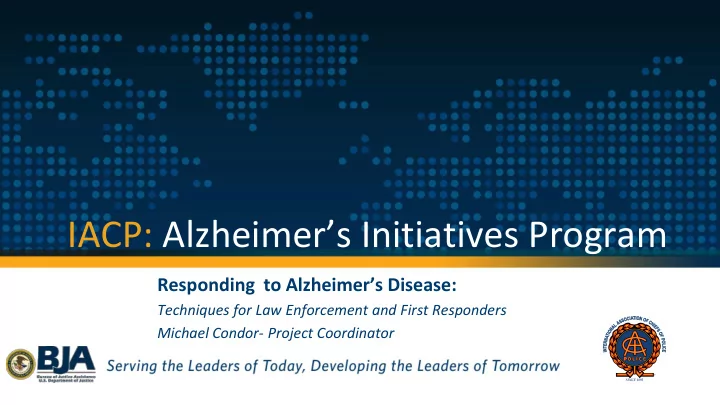

IACP: Alzheimer’s Initiatives Program Responding to Alzheimer’s Disease: Techniques for Law Enforcement and First Responders Michael Condor- Project Coordinator
G IG H ARBOR , WA – J ANUARY 1, 2013
I T ’ S H APPENING E VERYWHERE Hamilton Township, NJ
A LZHEIMER ' S I NITIATIVES P ROJECT • Started in 2009- through grant from Bureau of Justice Assistance, U.S. Dept. of Justice • Advisory Board formed, curriculum developed • Created a series of tools and resources • 2012- Launched in-person training program
T RAINING A CROSS THE C OUNTRY • Since June 2012: Conducted 10 training sessions • Trained 457 participants from 246 departments • Upcoming trainings in MA, KS, VA, NJ, ID, MN, CA
A LZHEIMER ’ S D ISEASE A FFECTS E VERYONE Law Enforcement & First Responders Persons with Alzheimer’s disease Community Caregivers
W ARNING S IGNS FOR LE • Erratic driving • Initial observation of vehicle • Information on MDT • Initial interaction with driver • Preliminary investigation
T IPS & T ECHNIQUES FOR L AW E NFORCEMENT • Interview the driver • VERY IMPORTANT to properly identify characteristics of the disease • ALWAYS write a citation *Start the paper-trail • DMV referral • Internal reporting • Follow up with caregivers
T IPS FOR THE C AREGIVERS - T IME TO T AKE A CTION • Take the keys (Do NOT just hide them) • Disable vehicle • Be Creative! • If all else fails…SELL vehicle
R EMOVAL OF D RIVING P RIVILEGES • Loss of independence for both patient and caregiver • “I don’t want to hurt them…this is their last freedom” • Denial of disease • Caregiver does not know exactly how far disease has progressed until LE gets involved
L OCATIVE T ECHNOLOGIES • Global Positioning Systems (GPS) • Land-Based Tracking Systems -Radio Frequency (RF) • Network Assisted GPS (A-GPS)
R ESOURCES FOR LE AND C AREGIVERS • The IACP • Alzheimer’s Association • Maryland DMV • Project LifeSaver • Senior Centers • AOTA
Y OU C AN ’ T M AKE A SSUMPTIONS
Recommend
More recommend